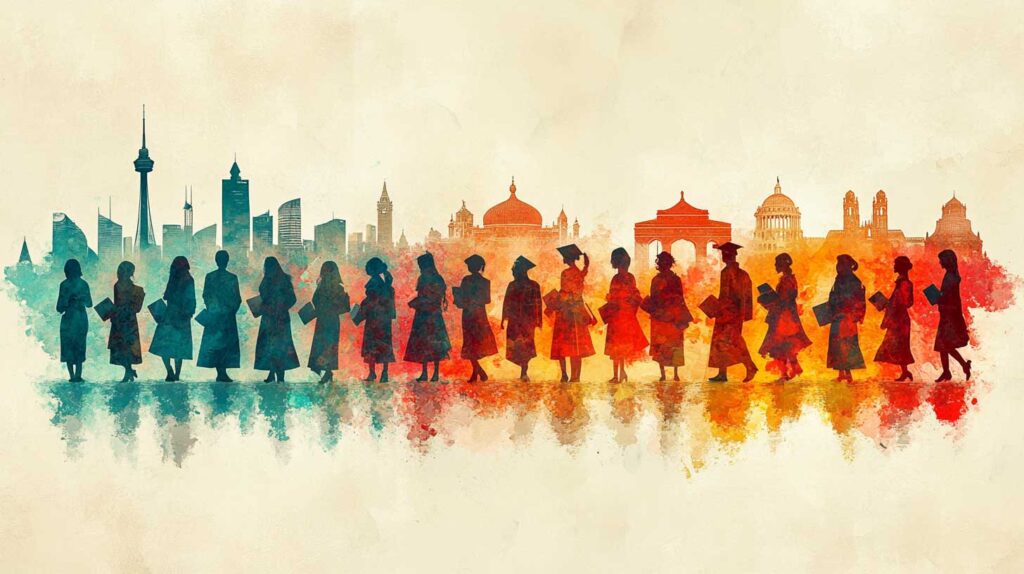
The Iranian Diaspora: A World of Innovation, Art, and Impact
The Iranian diaspora is more than just a community scattered across the globe. It’s a vibrant, diverse network of innovators, creatives, and leaders who have transformed every field they’ve touched. Today, millions of Iranians living abroad continue to push boundaries, reshape industries, and maintain a unique cultural bridge between East and West.
Estimates suggest that between 4 to 5 million Iranians live abroad, contributing to various fields such as technology, arts, and academia.
Historical Context and Migration Patterns
The 1979 revolution marked a pivotal point, leading to a substantial exodus of Iranians due to political upheaval and socio-economic changes. This initial wave primarily consisted of professionals, academics, and entrepreneurs seeking stability and opportunities abroad. In subsequent decades, economic challenges and political uncertainties have continued to drive emigration, often referred to as a “brain drain.” Notably, in 2024, the number of Iranian students abroad reached a record high, underscoring the ongoing talent outflow.
Demographic Distribution
The United States hosts the largest Iranian community outside Iran, with significant populations in California, particularly Los Angeles—affectionately dubbed “Tehrangeles.” This area has become a cultural hub, reflecting a blend of Iranian traditions and American lifestyle.
Beyond the U.S., substantial Iranian communities exist in Canada, Germany, Sweden, and the United Kingdom. In Europe, approximately 512,000 Iranian nationals resided as of 2020, with Germany and Sweden being prominent destinations.
Socio-Economic Contributions
Iranians abroad have made remarkable contributions across various sectors. In the United States, for instance, Iranian-Americans have significantly impacted the technology industry, with figures like Pierre Omidyar, founder of eBay, exemplifying this influence. Studies indicate that nearly 60% of Iranians abroad hold at least an undergraduate degree, and they exhibit one of the highest rates of self-employment among immigrant groups.
Cultural Influence and Identity
Maintaining cultural heritage is a cornerstone of the Iranian diaspora’s identity. Communities have established cultural centers, language schools, and media outlets to preserve and promote Persian culture. Events such as Nowruz (Persian New Year) are celebrated with enthusiasm, fostering a sense of unity and cultural pride among Iranians abroad. Moreover, Iranian artists, musicians, and writers in the diaspora have enriched global arts, bringing Persian cultural narratives to international audiences.
Challenges and Community Dynamics
Despite their successes, the Iranian diaspora faces challenges, including identity fragmentation along political, ethnic, religious, and generational lines. These divisions can impact community cohesion and the collective ability to address common issues. Efforts are ongoing within diaspora communities to bridge these gaps and foster a unified identity that honors both their Iranian heritage and their experiences in adopted homelands.
Notable Iranians in Business and Technology
Pierre Omidyar (Founder of eBay)
One of the most famous Iranian entrepreneurs, Pierre Omidyar, founded eBay in 1995, revolutionizing online commerce. Today, eBay is a multi-billion-dollar global marketplace. Omidyar has since focused on philanthropy, supporting independent media and humanitarian causes through The Omidyar Network.
Omid Kordestani (Google & Twitter Executive)
A key figure in Silicon Valley, Omid Kordestani played a critical role in Google’s early success, helping turn it into a global powerhouse. He later served as the Executive Chairman of Twitter and has been recognized for his contributions to the tech industry.
Anousheh Ansari (First Female Space Tourist & CEO of XPrize)
A trailblazer in aerospace, Anousheh Ansari became the first Iranian woman in space in 2006. She is also the CEO of the XPrize Foundation, which funds innovations in space exploration, AI, and sustainability.
Dr. Firouz Naderi (NASA Scientist)
The late Dr. Firouz Naderi was instrumental in NASA’s Mars exploration programs, playing a leading role in the success of missions like Curiosity Rover. His work contributed significantly to humanity’s understanding of Mars and the solar system.
Iranians in Academia and Science
Maryam Mirzakhani (Mathematician & Fields Medalist)
The late Maryam Mirzakhani was a mathematical genius and the first woman ever to win the Fields Medal, often referred to as the “Nobel Prize of Mathematics.” Her groundbreaking work in geometry and topology has left a lasting impact on the field.
Dr. Pardis Sabeti (Geneticist & Computational Biologist)
A professor at Harvard University, Dr. Pardis Sabeti is known for her research in genetics and infectious diseases, helping to decode Ebola and COVID-19. She has been recognized as one of the most innovative minds in science.
Ali Javan (Inventor of the Gas Laser)
Ali Javan was a physicist whose invention of the gas laser in 1960 laid the groundwork for modern telecommunications, barcode scanners, and laser surgery. His contributions to science continue to impact daily life.
Iranians in Entertainment and Arts
Shohreh Aghdashloo (Academy Award-nominated actress)
A powerful voice in cinema, Shohreh Aghdashloo is an Oscar-nominated actress, widely recognized for her performances in films like House of Sand and Fog and TV series The Expanse.
Shirin Neshat (Visual Artist & Filmmaker)
Shirin Neshat is an internationally acclaimed artist and filmmaker whose works explore themes of exile, feminism, and Iranian identity. She has won the Venice Biennale’s Golden Lion Award and the Silver Lion at the Venice Film Festival.
Ramin Djawadi (Composer of Game of Thrones)
The music behind Game of Thrones was composed by Ramin Djawadi, an Iranian-German musician. His compositions have also shaped the soundtracks of Westworld, Iron Man, and Pacific Rim.
Iranians in Politics and Human Rights
Nazanin Boniadi (Actress & Human Rights Advocate)
Known for her roles in Homeland and The Lord of the Rings: The Rings of Power, Nazanin Boniadi is also a fierce human rights activist, advocating for democracy and women’s rights in Iran.
Hadi Partovi (CEO of Code.org & Tech Entrepreneur)
A key player in the global tech education movement, Hadi Partovi co-founded Code.org, an organization dedicated to promoting computer science education in schools worldwide.
Reza Aslan (Scholar & Author)
A religious scholar and best-selling author, Reza Aslan is known for his works on Islamic history, including Zealot: The Life and Times of Jesus of Nazareth and No God but God. He is a prominent voice in discussions on religion and Middle Eastern politics.
The Fusion of Heritage and Modernity
Culinary Innovations
Beyond business and art, the diaspora is also making waves in the culinary world. Innovative Iranian chefs are reinventing traditional recipes to create fusion cuisines that honor Persian flavors while embracing local ingredients. Pop-up restaurants, food trucks, and gourmet cafes are now common in major cities, providing a delicious taste of Iran to food lovers everywhere.
Sports and Physical Culture
In sports, too, the Iranian diaspora is leaving a mark. From professional soccer players to fitness influencers and martial artists, Iranians abroad are showcasing their passion and resilience. They are not only excelling in their sports but also using athletic platforms to promote healthy lifestyles and cultural pride.
Looking Forward: A Diaspora That Inspires
The narrative of the Iranian diaspora is one of perpetual reinvention. Whether it’s through technological breakthroughs, artistic revolutions, or social activism, Iranians abroad continue to redefine success in a rapidly changing global landscape. Their story is a reminder that culture, innovation, and community are not confined by borders—they flourish wherever passion and determination reside.
As the Iranian diaspora evolves, it brings with it an inspiring message: that heritage and modernity can coexist harmoniously, driving progress and nurturing a better, more connected world. This dynamic blend of tradition and innovation is not only shaping global industries but also redefining what it means to be Iranian in the 21st century.

